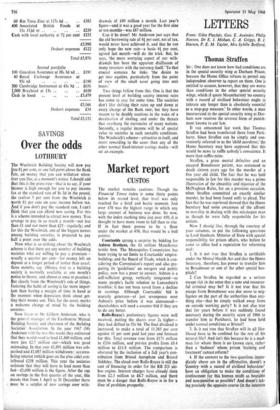Over the odds
SAVINGS LOTHBURY
ratThe Woolwich Building Society will now pay ou 81 per cent, or one full point above the Bank e, on money that you can withdraw when- 6er you like, at a moment's notice. I should add
at this is the gross rate—that is to say, if your income is high enough for you to pay income fax at the standard rate of 8s 3d in the pound, the taxfree 5 per cent from the Woolwich is
innorth 8f per cent on your income before tax. nd if you don't pay the standard rate, I can't ' k that you can afford new saving. For this is a scheme intended to attract new money. You arrange to pay in so much a month—not less than £1 and not more than £25—regularly; and for this the Woolwich, one of the biggest names among building societies, is prepared to pay half a point over the odds.
Now what is so striking about the Woolwich scheme is that there are any number of building Societies who are willing to pay a premium— usually a quarter per cent—for money left on deposit at a longer period of notice than usual; three months, say. (Money lent to a building society is normally available at one month's notice in theory, and almost at once in practice.) But clearly from the Woolwich's side of things, fostering the habit of saving is far more impor-
thtant than having a margin of time in hand at e moment when depositors think about get- ting their money out. This, for the saver, marks a welcome change of mind by the building societies.
Now listen to Mr Gilbert Anderson, who is the general manager of the Eastbourne Mutual Building Society and chairman of the Building Societies' Association. In the year 1967 (Mr Anderson told the BSA this week) they estimated that they would need to lend £1,460 million, and were just £2.7 million out—which was good estimating. In that year £1,891 million was sub- scribed and £1,087 million withdrawn : accumu- lating interest (which goes on the plus side) con- tributed £258 million. This year the societies estimate that they will have to lend more than last—f1,600 million is the figure. After the run on savings in the first quarter of the year, this means that from 1 April to 31 December there must be a surplus of new savings over with-
drawals of £80 million a month. Last year's figure—and it was a good year for the first nine or ten months—was £87 million.
Can it be done? Mr Anderson just says that the old borrowing rate of 41 per cent, net of tax, would never have achieved it, and that he can only hope the new rate—a basic 4f per cent, agreed last month—will do the trick. But, he says, 'the more worrying aspect of our with- drawals has been the apparent disillusion of many investors with the currency itself.' To that crucial sentence he links 'the desire to get into equities, particularly from the point of view of the small saver going into unit trusts.'
Two things follow from this. One is that the present level of building society interest rates has come to stay for some time. The societies don't like shifting their rates up and down at every change of the Bank rate; but they have reason to be doubly cautious in the wake of a devaluation of sterling, and under the threats that overhang the currencies of many nations. Secondly, a regular income will be of special value to societies in such unstable conditions. The Woolwich's scheme—attractive in itself, and more rewarding to the saver than any of the other normal fixed-interest savings media—will set an example.






































 Previous page
Previous page